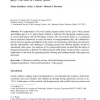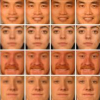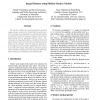2045 search results - page 323 / 409 » Learning programming with Erlang |
120
Voted
CSCL
2010
14 years 9 months ago
2010
We implemented a five-week family program called Family Quest where parents and children ages 9 to 13 played Quest Atlantis, a multiuser 3D educational computer game, at a local af...
124
Voted
ICIP
2008
IEEE
16 years 4 months ago
2008
IEEE
In this paper, we address the problem of hallucinating a high resolution face given a low resolution input face. The problem is approached through sparse coding. To exploit the fa...
120
click to vote
ICPR
2000
IEEE
16 years 3 months ago
2000
IEEE
We describe a method for learning statistical models of images using a second-order hidden Markov mesh model. First, an image can be segmented in a way that best matches its stati...
97
Voted
CHI
2008
ACM
16 years 2 months ago
2008
ACM
Arizona State University's Arts, Media, and Engineering Program is currently addressing the need to assess the growth of group creativity in trans-disciplinary collaboration....
123
Voted
CHI
2003
ACM
16 years 2 months ago
2003
ACM
Fusion is a web-based system that enables end-users to rapidly and dynamically construct personalized visualization workspaces without programming. Users first use advanced data s...



